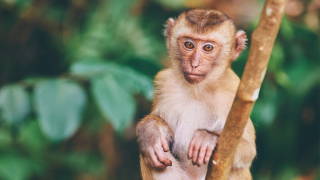
We call for proper law enforcement
We are again calling for proper enforcement of the law protecting animals used in experiments in the UK, after a new report revealed that macaques are being used in laboratories, including to test new medicines, without proper justification for their use or explanation of how much they will suffer.
A ‘Non-Human Primates Used In Service Licences’ report, written by the Animals in Science Committee (ASC), a group of eminent scientists which advises the Home Office on the use of animals in scientific procedures, has identified four main failings in the 11 animal testing licences it reviewed allowing the use of macaques between July 2018 and August 2022. These failings are:
-
Lack of explanation as to why the use of primates was justified
-
Lack of detail on how opportunities to replace, reduce or refine the use of animals had been considered
-
Failure to demonstrate the benefits to society of the testing performed
-
Lack of transparency in the explanations given of the experiments
The report found that ‘the licences… lacked detailed explanations as to why the use of non-human primates is scientifically justified’. Eight of the 11 licences predicted ‘moderate’ suffering for macaques, with procedures including the administration of test substances, restraint, surgery and restriction of food and water.
Primates are protected under animal testing law which states that they can only be used when no other species is suitable for the test, and even then only for research into life-threatening or debilitating conditions. Many of the 11 licenced projects lacked sufficient explanation of how these criteria had been met. This is despite the licence holders claiming that they had robust systems in place to ensure the law is followed.
The Animals (Scientific Procedures) Act 1986 – the law which relates to the use of animals in scientific research – says that the government must conduct a ‘harm-benefit analysis’ of any proposed animal testing, by weighing the harms to animals used in testing against the potential benefits to society. The report found ”a systemic failure to link the animal test being performed with the identity or specific intended use of the substances being tested”. This means that a harm-benefit analysis could not have been properly conducted because the supposed benefits to society were not specifically communicated.
The report also described a lack of detail in explanations of how the legal requirements to replace, reduce or refine the use of animals (known as the 3Rs) were considered. This follows a report last year from the UK’s government-sponsored National Centre for the 3Rs, which found that processes meant to safeguard against animal tests taking place, where a non-animal alternative could be used instead, are not working properly.
The law requires that Non-Technical Summaries (NTS) are supplied as part of the animal testing license application process -they are meant to explain in plain language what animals experience during tests, and what the tests aim to achieve. The ASC found that not all of the NTSs associated with the 11 licenses were written in ways that would likely be understood by the public. Cruelty Free International has previously highlighted a lack of clarity and comprehensiveness in NTSs supplied in both the UK and EU.
Our Director of Science and Regulatory Affairs, Dr Emma Grange, said: "The findings in this report are deeply concerning, exposing serious flaws in the current licensing system. If non-human primates are subject to these failures, even with the supposed additional legal protection and scrutiny surrounding their use, it raises troubling questions about the consideration afforded to all animals by the UK Home Office. The government claims that the regulation of animal testing in the UK is robust – but they must take immediate steps to ensure it actually delivers on this claim, and that their operations are fully in line with their stated commitment to phasing out animal testing. The public expects more, and serious improvements are needed to ensure the harm-benefit analysis isn’t just a tick-box exercise.”
Every minute, five animals suffer in experiments in British laboratories. By donating today, you could help us carry out research into non-animal test methods and make sure they are used. Will you join the fight for a cruelty-free UK today?
